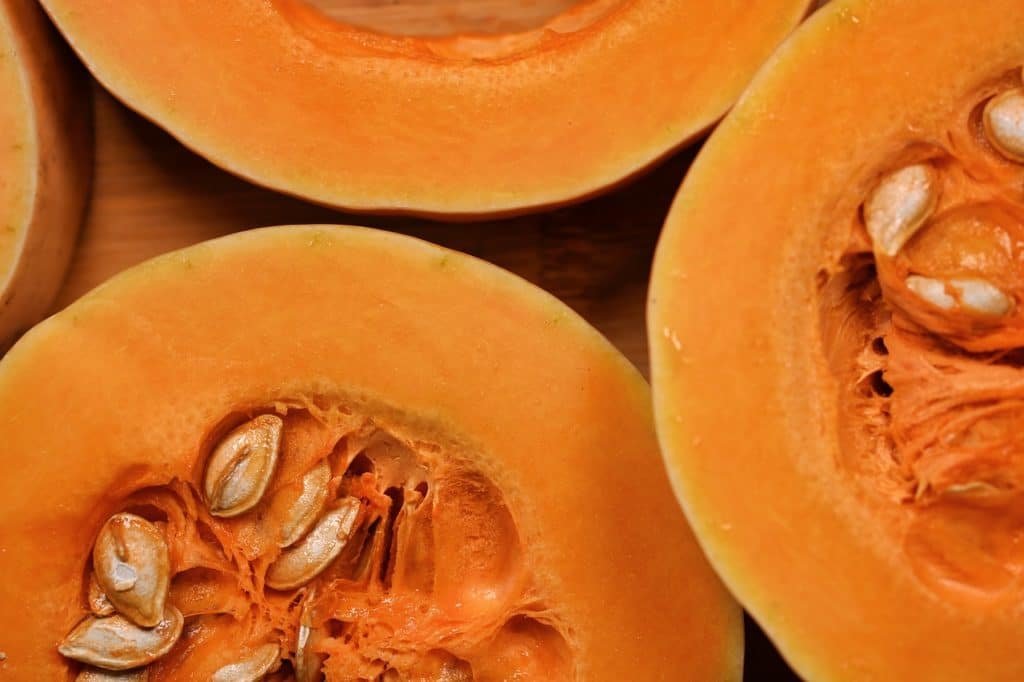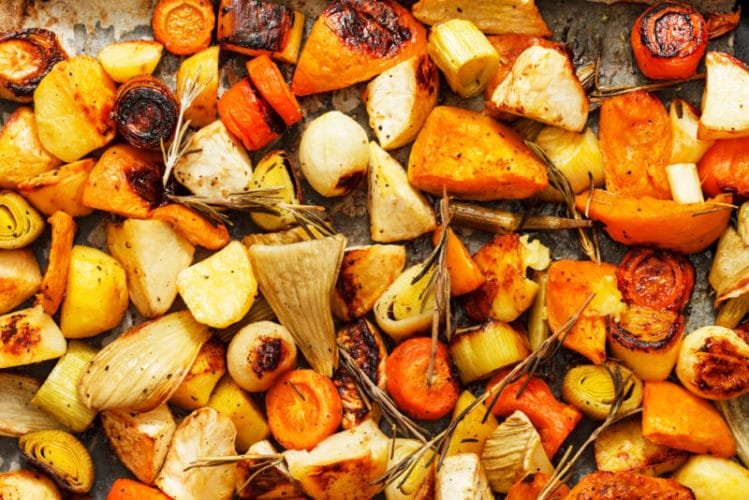Let’s speed up your mid-week meal prep! Cooking butternut squash can be time-consuming….unless you’ve got a bag frozen and ready to go!
Can You Freeze Butternut Squash?
Yes, you can freeze butternut squash for up to 9 months. The best way to do this is to peel your butternut squash, cut it in half, discard the seeds, and then cut it into 3/4in or 1.5cm cubes. Blanch the small cubes and then flash-freeze them on a baking tray. Lastly, transfer the frozen cubes to a labeled, air-tight, freezer safe container (removing as much air as possible). This will help retain the texture, colour, flavour and nutrients.
Do Does Butternut Squash freeze well? Yes
Can you refreeze Butternut Squash? No
How to Freeze Butternut Squash (Step-by-Step)

Just follow our steps below to freeze raw butternut squash in the best way. You will need to blanch it so it is not entirely raw, but it won’t be cooked through:
- Prepare Your Squash
You first need to take your butternut squash and remove the skin. Even after a long roast, it would be tough and unpleasant to eat. Use a sharp knife or peeler to carefully remove the tough outer skin, scoop out the seeds and discard them, then chop your raw squash into equal-sized chunks. - Blanch It
Next, parboil your butternut squash chunks in salted boiling water for around 5 minutes until the edges are fork-soft. Place your butternut squash into ice-cold water to stop the cooking and bring the temperature down. - Drain
Drain from the ice-cold water, then pat dry with paper towels to remove all excess water. - Flash Freeze
Tip your butternut squash onto a baking sheet and ensure no chunks touch one another. Cover the tray in foil or cling film and then place in the freezer overnight. - Final Freeze
Once frozen, remove the tray from the freezer then tip your frozen chunks into a freezer bag or airtight container and place them back into the freezer.
Make sure to label and date your container before placing it in the freezer.
It’s also worth noting that this method will work for all varieties of squash and will also work for different sizes. You can cut the squash into small cubes, large chunks or even slices.
In fact, this method is fairly universal for most hard, root vegetables such as swede, carrots and parsnips.
How to Freeze Different Forms of Butternut Squash
Freezing blanched butternut squash on its own is all good, but often, you’ll want dishes ready to use straight from the freezer. That’s why I’ve outlined how you can freeze cooked butternut squash in a couple of dishes below:
Roasted Squash
One of the most popular ways to cook butternut squash is to roast it with other vegetables and herbs. You can try a range of vegetable mixes, but I would recommend trying carrot, squash, leeks, onion, and celeriac.
Below is our method for freezing cooked butternut squash:
- Prep Veggies
Cut all your vegetables up into roughly the same size. - Roast
Place your vegetables into a roasting tray, drizzle with olive oil and then add herbs and seasoning. Roast in an oven at around 200C for 30 to 40 minutes until everything is cooked through and beginning to char. - Cool
Allow it all to cool - Bag Up
Once cooled, add portions to resealable freezer bags. You want to place a portion in each bag. This will allow you to grab a portion as and when you need it and also means you don’t need to flash freeze. - Freeze
Finally, place it in the freezer. To prevent it all clumping together you can shake the bag after 30 minutes.

Puree
Freezing pureed butternut squash is simple. Spoon it into an ice cube tray once you’ve made and cooled the puree using your favourite recipe. Wrap the tray in cling film and freeze.
When the cubes are frozen solid, remove them from the tray and place them in a bag back in the freezer.
When you need some puree, grab a cube or two and melt it over a low heat. You might want to add a knob of butter to make it silky and shiny.
You can also freeze butternut squash curry, butternut squash soup and stews and casseroles that contain butternut squash.
How Long Can You Freeze Butternut Squash?
Thankfully, butternut squash can be frozen for up to nine months. For optimal results store your frozen butternut squash for six months in the freezer.
It is important to label your container prior to placing it in the freezer so it stays at its best before being used for cooking.
How Do You Defrost Butternut Squash?
The good news is that sliced or chunked frozen squash can be cooked for several minutes directly from frozen.
Like many frozen vegetables, butternut squash can be cooked for several minutes in boiling water or in a steamer. However, this can result in limp and soggy butternut squash.
Alternatively, it can be tossed in oil and seasoning, and roasted for around 30 minutes for the ultimate side dish. Frozen butternut squash can be cooked directly in stock to be prepared for soups and stews.
Can You Refreeze Butternut Squash?
Although it is safe to do in most instances, I would still avoid refreezing butternut squash if it can be helped. When you refreeze any food, you risk completely ruining the texture. You’ll also find that the flavour degrades far quicker.
Instead, flash freeze your butternut squash as outlined above so you can easily defrost the quantity of squash you need as and when.
Does Butternut Squash Freeze Well?
Whether best fresh or frozen depends on how it will be prepared.
Frozen squash holds a different texture than fresh, so for recipes where texture matters, fresh is best. However for soups, stews and purees, frozen works just fine, too.
FAQs
A whole squash will last for a long time in the fridge, maybe even 2 weeks. Once peeled and cut up, butternut squash will last for 4 to 5 days in the fridge.
Yes, cooked squash can be frozen. This includes roasted, boiled or steamed squash. Once cooled, it can be placed onto a baking tray and frozen individually. It can then be bagged up.
Whether it’s cubed, diced or sliced, butternut squash can be frozen. Once cut into the desired shapes, blanch for a few minutes before freezing on a baking tray. Once frozen solid, pop them into a freezer bag to store for the longer term.
Sources
We have verified the information on this page using the following resources:


